MOVIES
Írán, 2015, 54 min
K. Mazaheri
27.01.2017 20:20
 Mina who lives in a corner of a park in Tehran, pays no mind to the hustle and bustle of the New Year's celebrations. The film gives us a glimpse into fourteen days of her life as she plays with dogs, exchanges banter with other homeless people in search of drugs and cigarettes, and sleeps next to piles of garbage.
Mina who lives in a corner of a park in Tehran, pays no mind to the hustle and bustle of the New Year's celebrations. The film gives us a glimpse into fourteen days of her life as she plays with dogs, exchanges banter with other homeless people in search of drugs and cigarettes, and sleeps next to piles of garbage.
Kaveh Mazaheri was born 1981 in Tehran, Iran. An interest in cinema led Mazaheri to begin writing film criticism for Iranian magazines after graduating from college in 2004. His first short film, Tweezers (2007), was censored in Iran. To date, he has made three independent short films and more than twenty short and long documentaries for broadcast on Iranian television. He is the editor and author of a great many projects aside from his own. Some of the films he has directed include Soori's Trip (Doumentary, 2009), Labyrinth (Docudrama Series, 2013, 15 Episodes), and Cockroach (Fiction Short, 2015). Lately A report about Mina won "Special Mention Prize" and was nominated "Ogawa Shinsuke Prize" from Yamagata Documentary Film Festival (Japan 2015).
Director, Production, Camera, Script: Kaveh Mazaheri
Edit: Pooyan Sholevar
Language of Dialogues: Persian
Language of Subtitles: English, Czech
Germany, USA, 2016, 52 min
M. Gruber, F. Seidel
28.01.2017 17:40
 An anthropologist and a linguist from Germany are trying to understand a ritual taking place in a small village on the coast of Guinea, West Africa. They are told that two seemingly conflicting ceremonies take place during a four-day event commemorating a recently deceased woman: A Muslim celebration of the 40th day after death conducted by a local Imam and the Mkisaata ritual, performed by the members of a Nalu female secret society in honour of its deceased member. As different male parties involved tell the filmmakers their respective vision of the events, the researchers get increasingly drawn into the ritual by the women of the secret society and become part of the performance. "Between Islam and the Sacred Forest" shows the possibilities and impossibilities of audio-visual ethnography.
An anthropologist and a linguist from Germany are trying to understand a ritual taking place in a small village on the coast of Guinea, West Africa. They are told that two seemingly conflicting ceremonies take place during a four-day event commemorating a recently deceased woman: A Muslim celebration of the 40th day after death conducted by a local Imam and the Mkisaata ritual, performed by the members of a Nalu female secret society in honour of its deceased member. As different male parties involved tell the filmmakers their respective vision of the events, the researchers get increasingly drawn into the ritual by the women of the secret society and become part of the performance. "Between Islam and the Sacred Forest" shows the possibilities and impossibilities of audio-visual ethnography.
Martin Gruber works as a researcher and lecturer at the Department of Anthropology and Cultural Studies at the University of Bremen. Martin studied Visual Anthropology at Goldsmiths College, London and Social Anthropology at Hamburg University. He worked as a freelance filmmaker and researcher before completing a PhD on Participatory Ethnographic Filmmaking" in 2013. Martin's research interests are audio-visual research, ethnographic film, collaborative research, urban anthropology, political ecology and human-animal relationships with a focus on bees. Martin has conducted long-term ethnographic research in West Africa, Southern Africa, Bremen and Hamburg.
Frank Seidel studied African Studies, Cultural Anthropology and Political Science at the University of Cologne, Germany. After completing his Ph.D. in 2008 and he worked as a Post-Doc and Visiting Researcher at the University of Florida from 2010 – 2015. Frank is an established fieldworker and his research methods use the full digital array currently available, namely video, audio, imagery, as well as the digital collation of various types of transcriptions. His approach to language research includes leading, training, and/or collaborating with a team of language community members to collect and manage audio-visual language material. Consequently, he now curates two digital language archives of two endangered languages spoken on the coast of Guinea, West Africa.
Director, Script, Edit: M. Gruber, F. Seidel
Production: M. Gruber
WORLD PREMIERE
Language of dialogues: Nalu Language
Language of Subtitles: English, Czech
Irák, 2016, 22 min
L. Askari
27.01.2017 18:35
 Mihemed, a journalist from Kobane in Syrian Kurdistan, renegotiates his future plans while living as a refugee in Slemani, Iraqi Kurdistan. Following the changing future perspectives of Mihemed's story, Bridge to Kobane ties together issues of migration, borders and future horizons in times of crisis.
Mihemed, a journalist from Kobane in Syrian Kurdistan, renegotiates his future plans while living as a refugee in Slemani, Iraqi Kurdistan. Following the changing future perspectives of Mihemed's story, Bridge to Kobane ties together issues of migration, borders and future horizons in times of crisis.
Lana Askari is a PhD candidate in Social Anthropology with Visual Media at the University of Manchester. Trained in Anthropology (MPhil Social Anthropology, University of Cambridge) and Documentary Filmmaking (MA Visual Anthropology, University of Manchester), she recently returned from her fieldwork in Slemani, Iraqi Kurdistan where she was a research affiliate at the American University of Iraq, Sulaimani. Her research areas include ethnographic documentary film, diaspora and migration, and the anthropology of time, infrastructure and the state.
Director, Camera, Edit, Script, Production: Lana Askari
Language of Dialogues: Kurdish
Language of Subtitles: English, Czech
Velká Británie, 2015, 47 min
A. Lawrence
28.01.2017 14:30
 British Born Chinese is a documentary film about Daniel and Kevin, two school boys born to Chinese migrants and living in Manchester. It engages their everyday struggles of reconciling their Britishness with Chineseness through their experiences at school, as volunteers at a community centre, and at home. We use an ethical approach driven by dialogue and close involvement with the film's subjects to understand the vulnerabilities through which the boys navigate their place in the British society. Our filmmaking as research not only uncovers new dimensions to understanding the ways our subjects experience their lifeworlds, but also seeks to reduce the epistemic violence of dominant forms of representation.
British Born Chinese is a documentary film about Daniel and Kevin, two school boys born to Chinese migrants and living in Manchester. It engages their everyday struggles of reconciling their Britishness with Chineseness through their experiences at school, as volunteers at a community centre, and at home. We use an ethical approach driven by dialogue and close involvement with the film's subjects to understand the vulnerabilities through which the boys navigate their place in the British society. Our filmmaking as research not only uncovers new dimensions to understanding the ways our subjects experience their lifeworlds, but also seeks to reduce the epistemic violence of dominant forms of representation.
Andrew Lawrence is a filmmaker and a teacher using anthropological knowledge and ethnographic research methods to explore issues using film and video. Andrew is filmmaker in residence and a Lecturer in Visual Anthropology at the Granada Centre for Visual Anthropology in Manchester, UK. Andy plays a leading role in the delivery of the MA in Visual Anthropology, and he is the principal tutor for the two week International Summer School, Filmmaking for Fieldwork. Andy studied social anthropology at UCL and visual anthropology at the Granada Centre before working for TV in the UK, USA and the Netherlands.
Director: Andrew Lawrence
Camera: A. Lawrence, B. Cheetham, T. Turner
Script: E. Barabantseva, A. Lawrence
Edit: K. Hanson
Production: E. Barabantseva
Language of Dialogues: English
language of Subtitles: Chinese, English, Czech
Nepál, 2016, 61 min
D. Tolange
28.01.2017 17:25
 Every year during winter thousands of Nepalis and Indians migrate to various parts of Nepal to work in brick factories. Many of these laborers are children who drop out school, engage in hard labor and never return back to school. DUST is an ethnographic film with the children working in brick kiln areas in Nepal.
Every year during winter thousands of Nepalis and Indians migrate to various parts of Nepal to work in brick factories. Many of these laborers are children who drop out school, engage in hard labor and never return back to school. DUST is an ethnographic film with the children working in brick kiln areas in Nepal.
Deepak Tolange is a filmmaker, photographer and researcher. Recently he completed M.A in Visual & Media Anthropology at the Freie Universität Berlin.
Director, camera, script, edit, production: Deepak Tolange
WORLD PREMIERE
Language of dialogues: Nepali, Hindi, Tamang
language of subtitles: English, Czech
Česká republika, 2017, 60 min
P. Borecký
28.01.2017 15:25
Elena Danilko, historian and filmmaker, will discuss with Frode Storaas and Jevgeny Aleksandrov, experienced visual anthropologists, the importance of salvage anthropology in contemporary ethnografic cinema, specifics of „nordic“ film school and temptations of non-disciplinary thinking.
The event is hosted by Pavel Borecký (Anthropictures).
No traslation into Czech. Languages are English and Russian.
Česká republika, 2017, 60 min
M. Pavlásek
27.01.2017 20:35
One of the possible ways of presenting the work of anthropologists and ethnologists, through which they are trying to understand the world arounds us, comes by means of ethnographic film. Similar efforts are also typical for film documentarists who can often uncover features of today´s society and spread them to the public. Both sides are linked together by the constant reflexion of own efforts coming out from its marginal position – searching for their own creative identity. Together with guests of the debate we will attempt to look closer at the specifics and background of visual anthropology and documentary, voice the possible common sources of inspiration and consider the possibilities and forms of cooperation.
Guests: Jaroslava Panáková, Ivo Bystřičan
The event is hosted by Michal Pavlásek (Antropictures)
Diskussion will be in Czech, without translation.
Švýcarsko, Velká Británie, 2016, 31 min
R. H. Sonderegger
28.01.2017 15:25
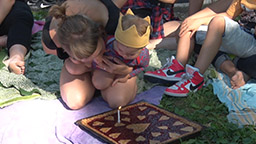 Mummy, mama and daddy; mummy, mama and sperm donor: The film Extended Family offers an intimate insight into two same-sex families' lives, who found a way to create their families within a legal grey zone in Switzerland. Swiss law bans access to adoption and any assisted reproductive medicine for same-sex couples. The portrayed families therefore do not exist officially. Nevertheless, according to estimations, there are between 6'000 and 30'000 children living in rainbow families across the country.
Mummy, mama and daddy; mummy, mama and sperm donor: The film Extended Family offers an intimate insight into two same-sex families' lives, who found a way to create their families within a legal grey zone in Switzerland. Swiss law bans access to adoption and any assisted reproductive medicine for same-sex couples. The portrayed families therefore do not exist officially. Nevertheless, according to estimations, there are between 6'000 and 30'000 children living in rainbow families across the country.
Ramona Helena Sonderegger was born in Altstätten (SG) Switzerland in 1982. 2004 Primary Teacher degree, Switzerland 2012 Field research in Kyrgyzstan, realisation as an ethnographic film 2013 BA in Social Anthropology, Political Sciences and Psychology at the University of Zurich, Switzerland 2013 Field research in Yaoundé, Cameroon together with a local NGO about the situation of women widows 2015 MA in Visual Anthropology with Ethnographic Documentary Film, Granada Centre, University of Manchester.
Director, camera, script, edit, production: Ramona H. Sonderegger
Festivals (selection): Regard Bleu Ethnographic Film Festival Zurich, Switzerland; Athens Ethnographic Film Festival, Greece; Society for Visual Anthropology Film and Media Festival, Minnesota, USA
Language of Dialogues: Swiss German
Language of Subtitles: English, Czech
Španělsko, 2016, 5 min
T. Iragorri
27.01.2017 19:00
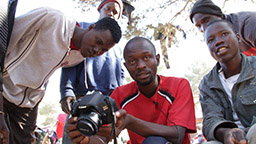 Melilla is a Spanish autonomous city located in northern Africa. In the forests of Gurugú mountain in Morocco, thousands of Africans await their time to jump the fence separating the two continents. Abou and Fofana are two friends who traveled together for years on the African continent to reach the Mount Gurugú mountain . Melilla fence has made separate.
Melilla is a Spanish autonomous city located in northern Africa. In the forests of Gurugú mountain in Morocco, thousands of Africans await their time to jump the fence separating the two continents. Abou and Fofana are two friends who traveled together for years on the African continent to reach the Mount Gurugú mountain . Melilla fence has made separate.
Telmo Iragorri - After graduating in Audiovisual Communication he works on EL MUNDO TV in the department of editing in programs for Telemadrid and Antena 3. He directs in 2012 Yatra , en busca del monzón and works in Paco de Lucía : la búsqueda (winner of the Goya for Best Documentary 2015 ) . In 2016 he co-directs the film Malú, ni un paso atrás.
Director, Script, Camera, Edit: Telmo Iragorri
Production: Vilcavaro, Barcelona
Language of Dialogues: Arabic, French, English
Language of Subtitles: English, Czech
Španělsko, 2016, 72 min
M.Á. Rosales
27.01.2017 21:25
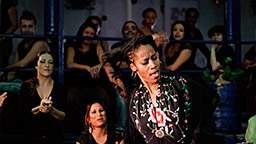 Today Europe's southern borders are shielded with barbed wire and fences, but once a trade flourished here that forcibly kidnapped thousands of african men and women into exile and exploitation. Giving voice to its Afro Andalusian memories, Gurumbé leads us to question Spanish identity, reminding us that Africa is weaved into its fabric.
Today Europe's southern borders are shielded with barbed wire and fences, but once a trade flourished here that forcibly kidnapped thousands of african men and women into exile and exploitation. Giving voice to its Afro Andalusian memories, Gurumbé leads us to question Spanish identity, reminding us that Africa is weaved into its fabric.
Miguel Ángel Rosales is an andalusian Anthropologist and Documentary Filmmaker.
Director, script: M. Á. Rosales
Production: Intermedia Producciones
Camera: Eduardo Montero
Edit: Andrés Zoilo
Festivals (selection): 40th SÂO PAULO INTERNATIONAL FILM FESTIVAL. Sâo Paulo, Brazil 2016; FILM AFRICA FESTIVAL. London, Great Britain 2016; FESTIVAL INTERNATIONAL DU FILM DE BRUXELLES. Bruxelles, Belgium 2016; 24th AFRICAN DIASPORA INTERNATIONAL FILM FESTIVAL. New York , USA 2016
Language of Dialogues: Spanish, Portuguese
Language of Subtitles: English, Czech
Rusko, 2015, 48 min
E. Alexandrov, E. Danilko
28.01.2017 16:00
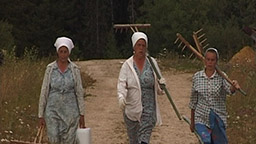 Krasnovishersky district of Perm Region.Taiga foothills of the Northern Urals. People's life here is determined by forest, which had always fed and given shelter to indigenous Finno-Ugric population. Closely-knit family of Old Believer priests Krechetov tries to resist to widespread destruction of traditional life. Haying time is not the best time to talk with the villagers – all are in the fields from youngsters to orders. ..Except our interlocutors... What are their memories of the remote past? How they respond to their current life? How they live now? What they believe in and what expect?
Krasnovishersky district of Perm Region.Taiga foothills of the Northern Urals. People's life here is determined by forest, which had always fed and given shelter to indigenous Finno-Ugric population. Closely-knit family of Old Believer priests Krechetov tries to resist to widespread destruction of traditional life. Haying time is not the best time to talk with the villagers – all are in the fields from youngsters to orders. ..Except our interlocutors... What are their memories of the remote past? How they respond to their current life? How they live now? What they believe in and what expect?
Evgeny Aleksandrov: Leading research assistant, Doctor of Fine Arts, the head of Visual Anthropology group of The Earth Science Museum at M.V.Lomonosov Moscow State University Has about 60 publications on visual anthropology. Producer of video works of CVA MSU (1989 - 2009) Creator and director of the Moscow International Festival of Visual Anthropology "Mediating Camera"
Elena Danilko: Current position is Doctor of History, Leading research assistant the Institute of Ethnology and Antropology Russian Academy of Science. Executive director of the Moscow International Festival for Visual Anthropology "Mediating Camera"-2010
Director, script: E. Aleksandrov, E. Danilko
Camera: E. Aleksandrov
Edit: Roman Likhacev
Production: Visual Anthropology and Media Lab, Ecocenter of Moscow State University
Festivals: Tartu Worldfilm Festival 2015, Ethnological Film Kratovo 2016
Language of Dialogues: Russian
Language of Subtitles: English, Czech
Česká republika, 2017, 32 min
M. Pavlásek, I. Bystřičan
27.01.2017 19:05
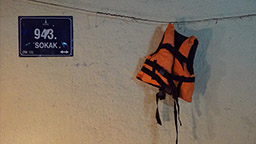 The mass is a distillation of human evolution, a parable about the treatment of substance, an image of the control over bodies that are hanged on the world’s tissue, or else disgorged from the ocean mass onto dry land, which is interwoven with bodies and the movement of hunters, gatherers, and vagabonds. Our observation of the various forms of abstracted masses, which we become part of at the same time, creates a platform of eternal presence – an active void if you will, which revolves in a closed circle, as though it had neither beginning nor end. What is left is just the stark presence of the traces of bared lives.
The mass is a distillation of human evolution, a parable about the treatment of substance, an image of the control over bodies that are hanged on the world’s tissue, or else disgorged from the ocean mass onto dry land, which is interwoven with bodies and the movement of hunters, gatherers, and vagabonds. Our observation of the various forms of abstracted masses, which we become part of at the same time, creates a platform of eternal presence – an active void if you will, which revolves in a closed circle, as though it had neither beginning nor end. What is left is just the stark presence of the traces of bared lives.
Michal Pavlásek is social anthropologist, university teacher, freelance journalist and documentarist, Turkish coffee lover, researcher at the Institute of Ethnology of the Czech Academy of Sciences, Co-founder of Anthropictures - flexible association of social scientists providing independent field research. In his research focuses on migration and multuculturalism. He is author of movies Searching for the Exit (2016), Another Vojvodovo: thinking in pictures (2013), Time Bows Beneath the Burden of the Grapes. The Past, Czechs and Germans in the Serbian Banat (2012).
Ivo Bystřičan is documentary filmmaker, story-editor and screenwriter. He directed several feature documentary films like Copper Age (2010), My Last 150 000 Cigarettes (2013), Byeway (2014), Mr. Chytil´s Crime (2014), Middle Dusk (2015) and many others. He graduated from sociology at Masaryk University in Brno and documentary filmmaking at FAMU in Prague.
Director, Production, Script: M. Pavlásek, I. Bystřičan
Camera, Edit: I.Bystřičan
Language of Dialogues: English, Greek
Language of subtitles: Czech
Česká republika, 2017, 10 min
My Street Films
28.01.2017 15:10
My Street Films aims to interconnect the young generation and audiovisual industry professionals. The online audiovisual map mystreetfilms.cz/en works with general audiences and people interested in media culture in an attractive way. Now we interconnect My Street Films and Antropofest.
USA, 2015, 23 min
E. Hong, M.Lai, M.Mihai
27.01.2017 20:00
 Nobel Nok Dah offers an intimate view into the lives of three refugee women from Burma, whose migratory paths cross in Thailand and eventually meet when they resettle to central New York. Drawing upon methods of feminist oral history and ethno-fiction, the film traces glimmers of subjectivity that complicate any singular narrative of the refugee experience. As camera movements follow the textures of everyday life and work, a weave of sensorial fragments immerse audiences in women's narratives of self, place, and belonging.
Nobel Nok Dah offers an intimate view into the lives of three refugee women from Burma, whose migratory paths cross in Thailand and eventually meet when they resettle to central New York. Drawing upon methods of feminist oral history and ethno-fiction, the film traces glimmers of subjectivity that complicate any singular narrative of the refugee experience. As camera movements follow the textures of everyday life and work, a weave of sensorial fragments immerse audiences in women's narratives of self, place, and belonging.
Emily Hong is a Seoul-born and New York-raised feminist anthropologist and filmmaker. A graduate of Columbia University and PhD Candidate at Cornell University, Emily’s research and professional expertise lies at the intersection of legal anthropology, media practice, and economic, social, and cultural rights. Emily has directed several collaborative films including Get By (2014), For My Art (2016), and Nobel Nok Dah (2015), which have explored issues of solidarity and labor, the gendered spectatorship of performance art, and questions of womanhood and identity in the refugee experience.
Miasarah Lai is a Puerto-Rican-Chinese-American director and cinematographer from the Lower East Side, New York City. As an MFA Candidate in Documentary Media at Northwestern University, she explores the physicality and performative role of the documentary cinematographer in the dance between the subject and its storytellers. Miasarah’sHer international body of work has included cinematography and directing for projects in Romania, Ghana, Myanmar, and China.
Mariangela Mihai, a Romanian Anthropology and Film PhD Candidate at Cornell University, has worked on issues of refugee political resettlement at the Emory Center for Ethics and the International Rescue Committee. Her current research looks at overlapping nationalisms, identity and ethnicity on the India-Burma border. Select film projects include: To Uphold the Law (2014), a film exploring ideologies of nationalism and anti-drone activism in Upstate N.Y.; and For My Art (2016), a twochannel video installation exploring the sensorial landscape of transition-era Burma/Myanmar through the figure of the performance artist.
Director, Camera, Edit: E. Hong, M.Lai, M.Mihai
Production: Ethnocine
Language od Dialogues: English
language of Subtitles: English, Czech
Slovenská republika, 2016, 65 min
J. Panáková
28.01.2017 19:15
 Viktor Valerevich Mumikhotkak also known as „Mukha", Yupik Eskimo from the hamlet New Chaplino (Chukotka, Russia), died tragically in 2012. Somebody stabbed him in his abdomen and cut off his fingers. In 2014, when young Alla Ukuma gave birth to her first son, her mother told her: „Last night I saw Mukha in my dream. He had come back in your boy. Let us name your baby Viktor". According to the local people, the dead can return to the realm of the living up to five times. This film essay on life, death and possible return poses the universal question: How do you confront your own end?
Viktor Valerevich Mumikhotkak also known as „Mukha", Yupik Eskimo from the hamlet New Chaplino (Chukotka, Russia), died tragically in 2012. Somebody stabbed him in his abdomen and cut off his fingers. In 2014, when young Alla Ukuma gave birth to her first son, her mother told her: „Last night I saw Mukha in my dream. He had come back in your boy. Let us name your baby Viktor". According to the local people, the dead can return to the realm of the living up to five times. This film essay on life, death and possible return poses the universal question: How do you confront your own end?
Jaroslava Panáková received her PhD in Social Anthropology at St. Petersburg State University in Russia and MA in documentary cinema at FAMU Prague, Czech Republic. Since 2001 she has been studying indigenous peoples of Polar Russia. She combines her fieldwork with the filmic approach. Author's short film "The seagull flying against the wind" (2005) was screened at the IFF in Jihlava and at the festival Oneworld. Her medium-length film "Being tourist at home" (2009) participated in 2009 at the East Silver market in Jihlava and in 2010, won the first Prize at the TOCOCU festival in Lisboa. Her long-feature film, Five Lives (2016), was claimed "the best doc on survival of indigenous peoples" at the XXX PÄRNU Film Festival.
Direcotr, camera, script: J. Panáková
Production: J.Panáková, spolek PAMODAJ
Edit: Šimon Špidla
Language of Dialogues: Russian
Language of subtitles: Slovak
Česká republika, 2016, 12 min
M. Romanutti
28.01.2017 14:35
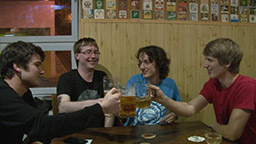 The film captures the way in which students spend a typical free night. Within the film we tried to monitore groups of students of the Faculty of Philosophy, University of West Bohemia and the Faculty of Applied Sciences, University of West Bohemia.
The film captures the way in which students spend a typical free night. Within the film we tried to monitore groups of students of the Faculty of Philosophy, University of West Bohemia and the Faculty of Applied Sciences, University of West Bohemia.
The film was made by four students who study at Faculty of Phylosophy at the University of West Bohemia in Pilsen. The film was made within the course of audio-visual technology in anthropology.
Director: Marcel Romanutti
Production: Jan Jaňour
Camera: Michaela Fryčková
Script: Ilona Čapková
Edit: M. Romanutti, J. Jaňour
Language of Dialogues: Czech
Language of Subtitles: none
Belgie, 2016, 55 min
O. Jourdain
28.01.2017 21:00
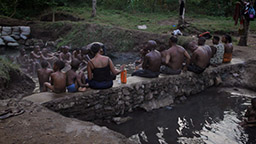 Guided by Vestine, an extravagant star of radio nights, the film discovers rwandan sexuality in search of the water that gushes out of the female body. It reveals with humour and sponaneity the mystery of female bliss. Sacred Water immerses you into a modern Rwanda rediscovering its heritage in the most intimate way: female pleasure.
Guided by Vestine, an extravagant star of radio nights, the film discovers rwandan sexuality in search of the water that gushes out of the female body. It reveals with humour and sponaneity the mystery of female bliss. Sacred Water immerses you into a modern Rwanda rediscovering its heritage in the most intimate way: female pleasure.
Olivier Jourdain - Passionate about Visual Anthropology, he studied Filmmaking in London as well as Anthropology in Leuven (KUL), after receiving a Masters in Communication in Brussels, IHECS. He has been traveling to Sub-Saharan Africa for over 15 years. Those numerous travels have changed his views on this vast and diverse continent. From Mali to Madagascar, the Congo, Ivory Coast and Rwanda, he have had the opportunity to make numerous documentaries and promotional films for NGO's and local communities.
Director: Olivier Jourdain
Production: Nameless Production
Camera: Christophe Rolin, Olivier Jourdain
Edit: Mélanie Leclech, Mathieu Piérart
Launcging of movie: DOK Leipzig next masters competition IDFA 2016 Panorama section
Language of Dialogues: Kinyarwanda Languagge
Language of Subtitles: English, Czech
Japonsko, Norsko, Nepál, 2015, 89 min
F. Storaas, D. Kharel
28.01.2017 18:55
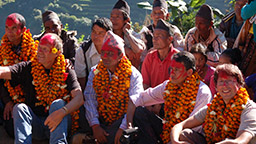 In Okharbot village of Western Nepal a few persons still know the age-old traditional practise of mining, smelting and casting of copper. The copper has a number of symbolic meanings and economic aspects connected to exchange and healing properties, as well as being the Hindu god Shiva. The complex caste system of Nepal, although abolished, still structures the lives of most people. The untouchable smiths, the Kami, produce one of the purest metals in Hindu cosmology. The film follows Ujir, the foreman, who guides the steps of the mining and smelting. During the smelting work the festival of Dassain took place in the village. The festival is part of the social and cultural context presented in the film along with the traditional smelting process of copper.
In Okharbot village of Western Nepal a few persons still know the age-old traditional practise of mining, smelting and casting of copper. The copper has a number of symbolic meanings and economic aspects connected to exchange and healing properties, as well as being the Hindu god Shiva. The complex caste system of Nepal, although abolished, still structures the lives of most people. The untouchable smiths, the Kami, produce one of the purest metals in Hindu cosmology. The film follows Ujir, the foreman, who guides the steps of the mining and smelting. During the smelting work the festival of Dassain took place in the village. The festival is part of the social and cultural context presented in the film along with the traditional smelting process of copper.
Dipesh Kharel is an independent documentary filmmaker from Nepal about to finish his PhD research in film and social anthropology at the University of Tokyo in Japan. He received a Master of Philosophy in documentary film studies from the University of Tromsø in Norway.
Frode Storaas is a professor of visual anthropology at the University Museum of Bergen, Norway. His anthropological research has mainly been with pastoralists in Eastern Africa. A theme conveyed in many of his films has been how cultural traditions and ideas influence everyday life. Storaas is gen.sec. of NAFA, a worldwide network for visual anthropology, and the NAFA collection of anthropological films.
Director, camera, script, edit: F. Storaas, D. Kharel
Production: University Museum of Bergen, Norway, Media Help Line, Nepal
Festivals (selection): 2015 Nepal Panorama, Best Documentary; 14th RAI INTERNATIONAL FESTIVAL OF ETHNOGRAPHIC FILM, Watershed in Bristol, England 2015
Language of Subtitles: Nepalese
Language of Dialogues: English, Czech
Mexiko, 2016, 42 min
J.B. Díaz, A. S. Eres, A.J. Arango
27.01.2017 19:10
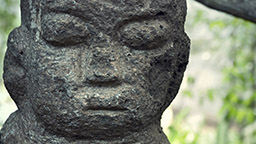 In the Municipality of Yahualica, Hidalgo, a Nahua community from Mexico, the archaeological pieces (named stone gods in their language) have the ability to make the population sick. Through an accurate knowledge the inhabitants of the municipality manage to deal with the power of the 'stone gods' in order to prevent possible damages and to benefit from the relationship with them. This facet of their reality has been seriously criticised by the Mexican media and the community has been deprived of a large part of their material heritage. This documentary pictures the life of the Nahuas from Yahualica, who have to coexist with the world of the stones, who make them sick, and with the world of the mestizos, who ridicule and rob them.
In the Municipality of Yahualica, Hidalgo, a Nahua community from Mexico, the archaeological pieces (named stone gods in their language) have the ability to make the population sick. Through an accurate knowledge the inhabitants of the municipality manage to deal with the power of the 'stone gods' in order to prevent possible damages and to benefit from the relationship with them. This facet of their reality has been seriously criticised by the Mexican media and the community has been deprived of a large part of their material heritage. This documentary pictures the life of the Nahuas from Yahualica, who have to coexist with the world of the stones, who make them sick, and with the world of the mestizos, who ridicule and rob them.
Jaime Bernardo Díaz is an anthropologist; Ana Somohano Eres and Antonio Jaramillo Arango are both historians. The three of them studying their PhDs at the UNAM, México, where they research about the social life objects can have in native communities dating before and after the Conquest.
Director, script, edit, production: J.B. Díaz, A.S. Eres, A.J. Arango
Camera: J.B. Díaz
Festivals: VI Congreso Mexicano de Antropología Social-Foro de cine etnográfico 2016; Instituto de Investigaciones Filológicas-Universidad Nacional Autónoma de México 2016
EUROPEAN PREMIÉRE
Language of Dialogues: Spanish
Language of Subtitles: Spanish, English, Czech
Jižní Afrika, 2015, 29 min
R. Horn
28.01.2017 16:30
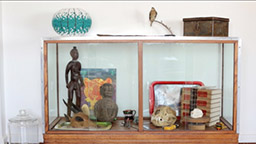 These Objects, Those Memories" is a split-screen film focused on material culture, specifically, that of three long-term Zimbabwean female migrants currently residing in Cape Town, South Africa. Through an exploration of the objects brought with them, objects sent back to their homeland, objects left behind and their associated memories; stories of joy, loss, and hopes for a return to Zimbabwe are examined.
These Objects, Those Memories" is a split-screen film focused on material culture, specifically, that of three long-term Zimbabwean female migrants currently residing in Cape Town, South Africa. Through an exploration of the objects brought with them, objects sent back to their homeland, objects left behind and their associated memories; stories of joy, loss, and hopes for a return to Zimbabwe are examined.
Roger Horn is a lecturer (University of Cape Town - Visual Anthropology and SAE Institute Cape Town - Documentary Production/Film Studies), PhD candidate in Anthropology, and filmmaker with over 18 years of television and film production experience. His research and filmic interests include material culture, migration, xenophobia, post colonialism, and gender and sexuality.
Director, camera, script, edit: Roger Horn
Production: Roger Horn Films
Festivals (selections): Le Cube Anthropologies Numeriques 4th Edition (March 2016 - Paris, France); EASA European Association of Social Anthropologists Conference (July 2016 - Milan, Italy); Eureka Springs Human Rights Fest (August 2016 - Arkansas, USA); Apricot Tree International Ethno Film Festival (Oct. 2016 - Armenia); Ethnographic Film Festival "Kratovo" 2016 (Oct.- Macedonia) ; Regard Bleu Film Festival 2016 (Oct. - Zurich, Switzerland) ; CEAD Contemporary Ethnography Across the Disciplines Conference (November 2016 - Cape Town, South Africa)
Language of Dialogues: English
language of Subtitles: English, Czech
Česká republika, 2016, 5 min
O. Raffel
28.01.2017 14:30
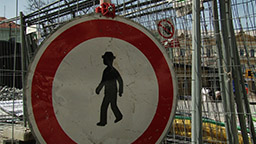 Parkour is a physical discipline of overcoming obstacles in urban environment. The film show an alternative use of urban space by parkour. It is not an aggressive resistance against the dominant movement in the city, but flowing with the city, move in the rhythm of the city.
Parkour is a physical discipline of overcoming obstacles in urban environment. The film show an alternative use of urban space by parkour. It is not an aggressive resistance against the dominant movement in the city, but flowing with the city, move in the rhythm of the city.
Ondřej Raffel is a student of master degree cultural a social anthropology at the University of West Bohemia.
Director, edit: O. Raffel
Production, camera, script: O Raffel, P. Šrámek
Language of dialogues: Czech
Language of subtitles: none
 Mina who lives in a corner of a park in Tehran, pays no mind to the hustle and bustle of the New Year's celebrations. The film gives us a glimpse into fourteen days of her life as she plays with dogs, exchanges banter with other homeless people in search of drugs and cigarettes, and sleeps next to piles of garbage.
Mina who lives in a corner of a park in Tehran, pays no mind to the hustle and bustle of the New Year's celebrations. The film gives us a glimpse into fourteen days of her life as she plays with dogs, exchanges banter with other homeless people in search of drugs and cigarettes, and sleeps next to piles of garbage.
 An anthropologist and a linguist from Germany are trying to understand a ritual taking place in a small village on the coast of Guinea, West Africa. They are told that two seemingly conflicting ceremonies take place during a four-day event commemorating a recently deceased woman: A Muslim celebration of the 40th day after death conducted by a local Imam and the Mkisaata ritual, performed by the members of a Nalu female secret society in honour of its deceased member. As different male parties involved tell the filmmakers their respective vision of the events, the researchers get increasingly drawn into the ritual by the women of the secret society and become part of the performance. "Between Islam and the Sacred Forest" shows the possibilities and impossibilities of audio-visual ethnography.
An anthropologist and a linguist from Germany are trying to understand a ritual taking place in a small village on the coast of Guinea, West Africa. They are told that two seemingly conflicting ceremonies take place during a four-day event commemorating a recently deceased woman: A Muslim celebration of the 40th day after death conducted by a local Imam and the Mkisaata ritual, performed by the members of a Nalu female secret society in honour of its deceased member. As different male parties involved tell the filmmakers their respective vision of the events, the researchers get increasingly drawn into the ritual by the women of the secret society and become part of the performance. "Between Islam and the Sacred Forest" shows the possibilities and impossibilities of audio-visual ethnography. Mihemed, a journalist from Kobane in Syrian Kurdistan, renegotiates his future plans while living as a refugee in Slemani, Iraqi Kurdistan. Following the changing future perspectives of Mihemed's story, Bridge to Kobane ties together issues of migration, borders and future horizons in times of crisis.
Mihemed, a journalist from Kobane in Syrian Kurdistan, renegotiates his future plans while living as a refugee in Slemani, Iraqi Kurdistan. Following the changing future perspectives of Mihemed's story, Bridge to Kobane ties together issues of migration, borders and future horizons in times of crisis. British Born Chinese is a documentary film about Daniel and Kevin, two school boys born to Chinese migrants and living in Manchester. It engages their everyday struggles of reconciling their Britishness with Chineseness through their experiences at school, as volunteers at a community centre, and at home. We use an ethical approach driven by dialogue and close involvement with the film's subjects to understand the vulnerabilities through which the boys navigate their place in the British society. Our filmmaking as research not only uncovers new dimensions to understanding the ways our subjects experience their lifeworlds, but also seeks to reduce the epistemic violence of dominant forms of representation.
British Born Chinese is a documentary film about Daniel and Kevin, two school boys born to Chinese migrants and living in Manchester. It engages their everyday struggles of reconciling their Britishness with Chineseness through their experiences at school, as volunteers at a community centre, and at home. We use an ethical approach driven by dialogue and close involvement with the film's subjects to understand the vulnerabilities through which the boys navigate their place in the British society. Our filmmaking as research not only uncovers new dimensions to understanding the ways our subjects experience their lifeworlds, but also seeks to reduce the epistemic violence of dominant forms of representation. Every year during winter thousands of Nepalis and Indians migrate to various parts of Nepal to work in brick factories. Many of these laborers are children who drop out school, engage in hard labor and never return back to school. DUST is an ethnographic film with the children working in brick kiln areas in Nepal.
Every year during winter thousands of Nepalis and Indians migrate to various parts of Nepal to work in brick factories. Many of these laborers are children who drop out school, engage in hard labor and never return back to school. DUST is an ethnographic film with the children working in brick kiln areas in Nepal. Mummy, mama and daddy; mummy, mama and sperm donor: The film Extended Family offers an intimate insight into two same-sex families' lives, who found a way to create their families within a legal grey zone in Switzerland. Swiss law bans access to adoption and any assisted reproductive medicine for same-sex couples. The portrayed families therefore do not exist officially. Nevertheless, according to estimations, there are between 6'000 and 30'000 children living in rainbow families across the country.
Mummy, mama and daddy; mummy, mama and sperm donor: The film Extended Family offers an intimate insight into two same-sex families' lives, who found a way to create their families within a legal grey zone in Switzerland. Swiss law bans access to adoption and any assisted reproductive medicine for same-sex couples. The portrayed families therefore do not exist officially. Nevertheless, according to estimations, there are between 6'000 and 30'000 children living in rainbow families across the country. Melilla is a Spanish autonomous city located in northern Africa. In the forests of Gurugú mountain in Morocco, thousands of Africans await their time to jump the fence separating the two continents. Abou and Fofana are two friends who traveled together for years on the African continent to reach the Mount Gurugú mountain . Melilla fence has made separate.
Melilla is a Spanish autonomous city located in northern Africa. In the forests of Gurugú mountain in Morocco, thousands of Africans await their time to jump the fence separating the two continents. Abou and Fofana are two friends who traveled together for years on the African continent to reach the Mount Gurugú mountain . Melilla fence has made separate. Today Europe's southern borders are shielded with barbed wire and fences, but once a trade flourished here that forcibly kidnapped thousands of african men and women into exile and exploitation. Giving voice to its Afro Andalusian memories, Gurumbé leads us to question Spanish identity, reminding us that Africa is weaved into its fabric.
Today Europe's southern borders are shielded with barbed wire and fences, but once a trade flourished here that forcibly kidnapped thousands of african men and women into exile and exploitation. Giving voice to its Afro Andalusian memories, Gurumbé leads us to question Spanish identity, reminding us that Africa is weaved into its fabric. Krasnovishersky district of Perm Region.Taiga foothills of the Northern Urals. People's life here is determined by forest, which had always fed and given shelter to indigenous Finno-Ugric population. Closely-knit family of Old Believer priests Krechetov tries to resist to widespread destruction of traditional life. Haying time is not the best time to talk with the villagers – all are in the fields from youngsters to orders. ..Except our interlocutors... What are their memories of the remote past? How they respond to their current life? How they live now? What they believe in and what expect?
Krasnovishersky district of Perm Region.Taiga foothills of the Northern Urals. People's life here is determined by forest, which had always fed and given shelter to indigenous Finno-Ugric population. Closely-knit family of Old Believer priests Krechetov tries to resist to widespread destruction of traditional life. Haying time is not the best time to talk with the villagers – all are in the fields from youngsters to orders. ..Except our interlocutors... What are their memories of the remote past? How they respond to their current life? How they live now? What they believe in and what expect? The mass is a distillation of human evolution, a parable about the treatment of substance, an image of the control over bodies that are hanged on the world’s tissue, or else disgorged from the ocean mass onto dry land, which is interwoven with bodies and the movement of hunters, gatherers, and vagabonds. Our observation of the various forms of abstracted masses, which we become part of at the same time, creates a platform of eternal presence – an active void if you will, which revolves in a closed circle, as though it had neither beginning nor end. What is left is just the stark presence of the traces of bared lives.
The mass is a distillation of human evolution, a parable about the treatment of substance, an image of the control over bodies that are hanged on the world’s tissue, or else disgorged from the ocean mass onto dry land, which is interwoven with bodies and the movement of hunters, gatherers, and vagabonds. Our observation of the various forms of abstracted masses, which we become part of at the same time, creates a platform of eternal presence – an active void if you will, which revolves in a closed circle, as though it had neither beginning nor end. What is left is just the stark presence of the traces of bared lives. Nobel Nok Dah offers an intimate view into the lives of three refugee women from Burma, whose migratory paths cross in Thailand and eventually meet when they resettle to central New York. Drawing upon methods of feminist oral history and ethno-fiction, the film traces glimmers of subjectivity that complicate any singular narrative of the refugee experience. As camera movements follow the textures of everyday life and work, a weave of sensorial fragments immerse audiences in women's narratives of self, place, and belonging.
Nobel Nok Dah offers an intimate view into the lives of three refugee women from Burma, whose migratory paths cross in Thailand and eventually meet when they resettle to central New York. Drawing upon methods of feminist oral history and ethno-fiction, the film traces glimmers of subjectivity that complicate any singular narrative of the refugee experience. As camera movements follow the textures of everyday life and work, a weave of sensorial fragments immerse audiences in women's narratives of self, place, and belonging. Viktor Valerevich Mumikhotkak also known as „Mukha", Yupik Eskimo from the hamlet New Chaplino (Chukotka, Russia), died tragically in 2012. Somebody stabbed him in his abdomen and cut off his fingers. In 2014, when young Alla Ukuma gave birth to her first son, her mother told her: „Last night I saw Mukha in my dream. He had come back in your boy. Let us name your baby Viktor". According to the local people, the dead can return to the realm of the living up to five times. This film essay on life, death and possible return poses the universal question: How do you confront your own end?
Viktor Valerevich Mumikhotkak also known as „Mukha", Yupik Eskimo from the hamlet New Chaplino (Chukotka, Russia), died tragically in 2012. Somebody stabbed him in his abdomen and cut off his fingers. In 2014, when young Alla Ukuma gave birth to her first son, her mother told her: „Last night I saw Mukha in my dream. He had come back in your boy. Let us name your baby Viktor". According to the local people, the dead can return to the realm of the living up to five times. This film essay on life, death and possible return poses the universal question: How do you confront your own end? The film captures the way in which students spend a typical free night. Within the film we tried to monitore groups of students of the Faculty of Philosophy, University of West Bohemia and the Faculty of Applied Sciences, University of West Bohemia.
The film captures the way in which students spend a typical free night. Within the film we tried to monitore groups of students of the Faculty of Philosophy, University of West Bohemia and the Faculty of Applied Sciences, University of West Bohemia. Guided by Vestine, an extravagant star of radio nights, the film discovers rwandan sexuality in search of the water that gushes out of the female body. It reveals with humour and sponaneity the mystery of female bliss. Sacred Water immerses you into a modern Rwanda rediscovering its heritage in the most intimate way: female pleasure.
Guided by Vestine, an extravagant star of radio nights, the film discovers rwandan sexuality in search of the water that gushes out of the female body. It reveals with humour and sponaneity the mystery of female bliss. Sacred Water immerses you into a modern Rwanda rediscovering its heritage in the most intimate way: female pleasure. In Okharbot village of Western Nepal a few persons still know the age-old traditional practise of mining, smelting and casting of copper. The copper has a number of symbolic meanings and economic aspects connected to exchange and healing properties, as well as being the Hindu god Shiva. The complex caste system of Nepal, although abolished, still structures the lives of most people. The untouchable smiths, the Kami, produce one of the purest metals in Hindu cosmology. The film follows Ujir, the foreman, who guides the steps of the mining and smelting. During the smelting work the festival of Dassain took place in the village. The festival is part of the social and cultural context presented in the film along with the traditional smelting process of copper.
In Okharbot village of Western Nepal a few persons still know the age-old traditional practise of mining, smelting and casting of copper. The copper has a number of symbolic meanings and economic aspects connected to exchange and healing properties, as well as being the Hindu god Shiva. The complex caste system of Nepal, although abolished, still structures the lives of most people. The untouchable smiths, the Kami, produce one of the purest metals in Hindu cosmology. The film follows Ujir, the foreman, who guides the steps of the mining and smelting. During the smelting work the festival of Dassain took place in the village. The festival is part of the social and cultural context presented in the film along with the traditional smelting process of copper. In the Municipality of Yahualica, Hidalgo, a Nahua community from Mexico, the archaeological pieces (named stone gods in their language) have the ability to make the population sick. Through an accurate knowledge the inhabitants of the municipality manage to deal with the power of the 'stone gods' in order to prevent possible damages and to benefit from the relationship with them. This facet of their reality has been seriously criticised by the Mexican media and the community has been deprived of a large part of their material heritage. This documentary pictures the life of the Nahuas from Yahualica, who have to coexist with the world of the stones, who make them sick, and with the world of the mestizos, who ridicule and rob them.
In the Municipality of Yahualica, Hidalgo, a Nahua community from Mexico, the archaeological pieces (named stone gods in their language) have the ability to make the population sick. Through an accurate knowledge the inhabitants of the municipality manage to deal with the power of the 'stone gods' in order to prevent possible damages and to benefit from the relationship with them. This facet of their reality has been seriously criticised by the Mexican media and the community has been deprived of a large part of their material heritage. This documentary pictures the life of the Nahuas from Yahualica, who have to coexist with the world of the stones, who make them sick, and with the world of the mestizos, who ridicule and rob them. These Objects, Those Memories" is a split-screen film focused on material culture, specifically, that of three long-term Zimbabwean female migrants currently residing in Cape Town, South Africa. Through an exploration of the objects brought with them, objects sent back to their homeland, objects left behind and their associated memories; stories of joy, loss, and hopes for a return to Zimbabwe are examined.
These Objects, Those Memories" is a split-screen film focused on material culture, specifically, that of three long-term Zimbabwean female migrants currently residing in Cape Town, South Africa. Through an exploration of the objects brought with them, objects sent back to their homeland, objects left behind and their associated memories; stories of joy, loss, and hopes for a return to Zimbabwe are examined. Parkour is a physical discipline of overcoming obstacles in urban environment. The film show an alternative use of urban space by parkour. It is not an aggressive resistance against the dominant movement in the city, but flowing with the city, move in the rhythm of the city.
Parkour is a physical discipline of overcoming obstacles in urban environment. The film show an alternative use of urban space by parkour. It is not an aggressive resistance against the dominant movement in the city, but flowing with the city, move in the rhythm of the city.